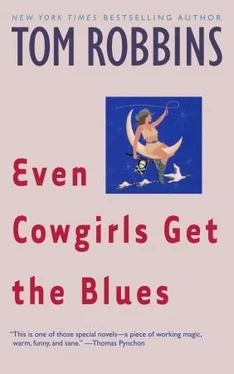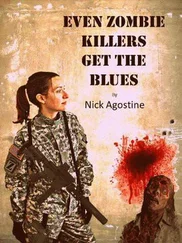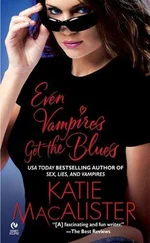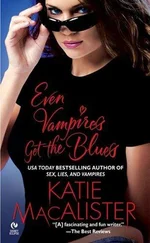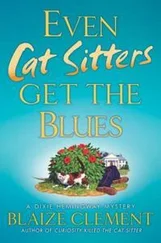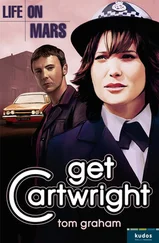“Maybe you have to call on the phone to get an elevator to come up to the penthouse. Maybe the buzzer is broken. Maybe I'm doing something wrong.”
Sissy had been waiting ten minutes. She felt trapped. Where was the elevator? Why wouldn't it respond? Teardrops were poking their bald heads out of her ducts.
It was more than just the elevator. Three days before, the Countess had procured a dress and buttoned her into it. She had agreed that it looked very nice. Then he went off — monocle, cigarette holder and everything — to Long Island, leaving her alone. The first evening, the watercolorist hadn't phoned. Sissy couldn't unbutton the dress, and to sleep in it would have left it geriatrically wrinkled. So she had sat up all night. She had watched TV, sipped red Ripple (the only beverage her host had in supply), read the New York Times and chanced pleased looks in the mirror. Alone on a June night in a seven-room penthouse. It had been strange.
At approximately ten in the morning the telephone rang. A voice that might have belonged to a Grecian urn, so soft and round and cultured it sounded, identified itself as belonging, instead, to Julian Gitche. Would Sissy Hankshaw please have dinner with Julian Gitche and friends on Friday next? Yes, Sissy Hankshaw would. The Countess's phone (a Princess — royalty sticks together) and, presumably, Julian Gitche's, had been replaced in the cradle. Dinner on Friday. It was then Wednesday.
As through the second TV-humming night she sat upright in the yoga position known as the dress-protecting asana , she reminded herself of Betty Clanton and the other girls of South Richmond High, setting their hair, combing it out, painting their lips, rouging their cheeks, washing their sweaters, pressing their skirts, primping away the hours and days of their youth in the peahen hope that for one blushing moment they could distract a boy from football. Nature had spared Sissy that as a teen-ager — but, mama, look at her now! Every hour or so, she became angry at herself, sprang up and announced to whatever television personality happened to be facing her that she was going to bed. She did not.
Thursday night was much the same, except that she was sleepier, angrier, more nervous. Newspapers, with their quaint accounts of politics and economics, TV, with its heroic policemen, could no longer amuse her. Red Ripple in hand, she fled to the balcony. She had passed the point where fresh air was of much use in reviving her, but she felt less confined pacing a patio in the New York sky.
“This is stupid, really dumb,” she told herself. “But if I'm going to do it I might as well do it right. I can't go to dinner in a good New York restaurant wearing a wrinkled sack. I'm used to skipping sleep on the road. I can make it.” Serenity once again illuminated the corners of her mouth, although her eyes, over which the lids drooped like detectives' bellies, failed to notice.
It was a cloudless night with only moderate smog. A furry northeaster was blowing in over Coney Island and Brooklyn, bringing to the upper East Side a teasing sniff of the ocean. Trembling with energy, unable to contain itself, Manhattan was popping wheelies beneath her. In every direction, her tired eyes saw flashing lights, lights that caromed off the horizons and joined with the stars in the sky. The city seemed to be inhaling Benzedrine and exhaling light; a neon-lunged Buddha chanting and vibrating in a temple of filth.
It was difficult for her to imagine that an American Indian was at home somewhere down there. Where exactly did he live, she wondered; which lights shone in his windows? What was he doing at this moment? Sleeping? (Sleep was bright on her mind.) Drinking — the way the Indians drank in LaConner, Taos, Pine Ridge, etc.? Performing a clandestine ghost dance or chanting to his private totem as prescribed in the dreamer religion? Watching “Custer” on TV? Painting watercolors? Until the dawn, she paced and pondered.
The day that followed had been a blur of boredom and misery; she was more asleep than awake. She found a loaf of Wonder Bread and wadded the soft individual slices into balls, as she had done when a kid, eating the bread balls on the balcony while watching traffic. Mostly, she sat around. (Were it not such an obvious understatement, we might say that she twiddled her thumbs.) When, however, at 7:45 P.M., Julian Gitche called to announce that he was downstairs, her central nervous system treated itself to a double adrenalin on the rocks. She flashed into consciousness, inspected herself — wrinkle-free! — in the mirror, took a pee and headed for the elevator. She had arranged to meet him in the lobby. Somehow it had seemed inappropriate to her to receive Mr. Gitche in the Countess's penthouse, with its frilly, sloppy and decidedly un-Indian décor.
Now Sissy was waiting for an elevator. She waited with a fatigue-induced approximation of that combination of stoicism and anxiety with which people wait for the Big Event that will transform their lives, invariably missing it when it does occur since both stoicism and anxiety are blinders.
At last, as she was on the brink of weeping, she heard a ping and saw a wink of green. A door slid open with a mechanical slur, to reveal a uniformed elevator operator looking sheepish and not altogether unafraid. Having suffered the Countess's ire on previous occasions, he was on the alert for a walking stick that might be mistaking his skull for a grand promenade. Relieved at seeing Sissy alone, he expressed her to the lobby at maximum speed.
The carpet felt like meadow to her hallucinating feet. The bronze fountain sounded like a mountain creek. Her redman glided from behind a tree (so what if it was a potted palm?). He was wearing a plaid dinner jacket and a yellow cummerbund. Of medium height, his shoulders were narrow, his face babified and puddingish. Approaching her, he smiled shyly. He reached to shake her hand — and fell immediately to his knees with an asthma attack.
COWGIRL INTERLUDE (LOVE STORY)
Some of the younger ranch hands — Donna, Kym and Heather; Debbie, too — have wondered aloud why Even Cowgirls Get the Blues couldn't be a simple love story.
Unfortunately, little darlings, there is no such thing as a simple love story. The most transitory puppy crush is complex to the extent of lying beyond the far reaches of the brain's understanding. (The brain has a dangerous habit of messing around with stuff it cannot or will not comprehend.)
Your author has found love to be the full trip, emotionally speaking; the grand tour: fall in love, visit both Heaven and Hell for the price of one. And that doesn't begin to cover it. If realism can be defined only as one of the fifty-seven varieties of decoration, then how can we hope for a realistic assessment of love?
No, the author has no new light to beam on the subject. After all, though people have been composing love songs for at least a thousand years, it wasn't until the late 1960s that any romantic ballad expressed a new idea. In his song “Triad” ( "Why can't we go on as three?" ), David Crosby offered the ménage à trois as a possible happy remedy for the triangularization that seems to be to love what hoof-and-mouth disease is to cattle (to employ an analogy that any cowgirl can understand). Bold David (Grace Slick of Jefferson Airplane recorded his song) sought to transport love beyond its dualistic limits; to accept the three-sided configuration as an inevitability, perceiving it as positive, building upon it, expanding it, drawing lines in different directions (". . in time there may be others "). But Crosby's Euclidean approach complicates love rather than simplifies it. And it is doubtful whether many lovers could endure further complications. As a visitor to the clockworks once heard the Chink say, “If it's sloppy, eat it over the sink.”
Читать дальше
